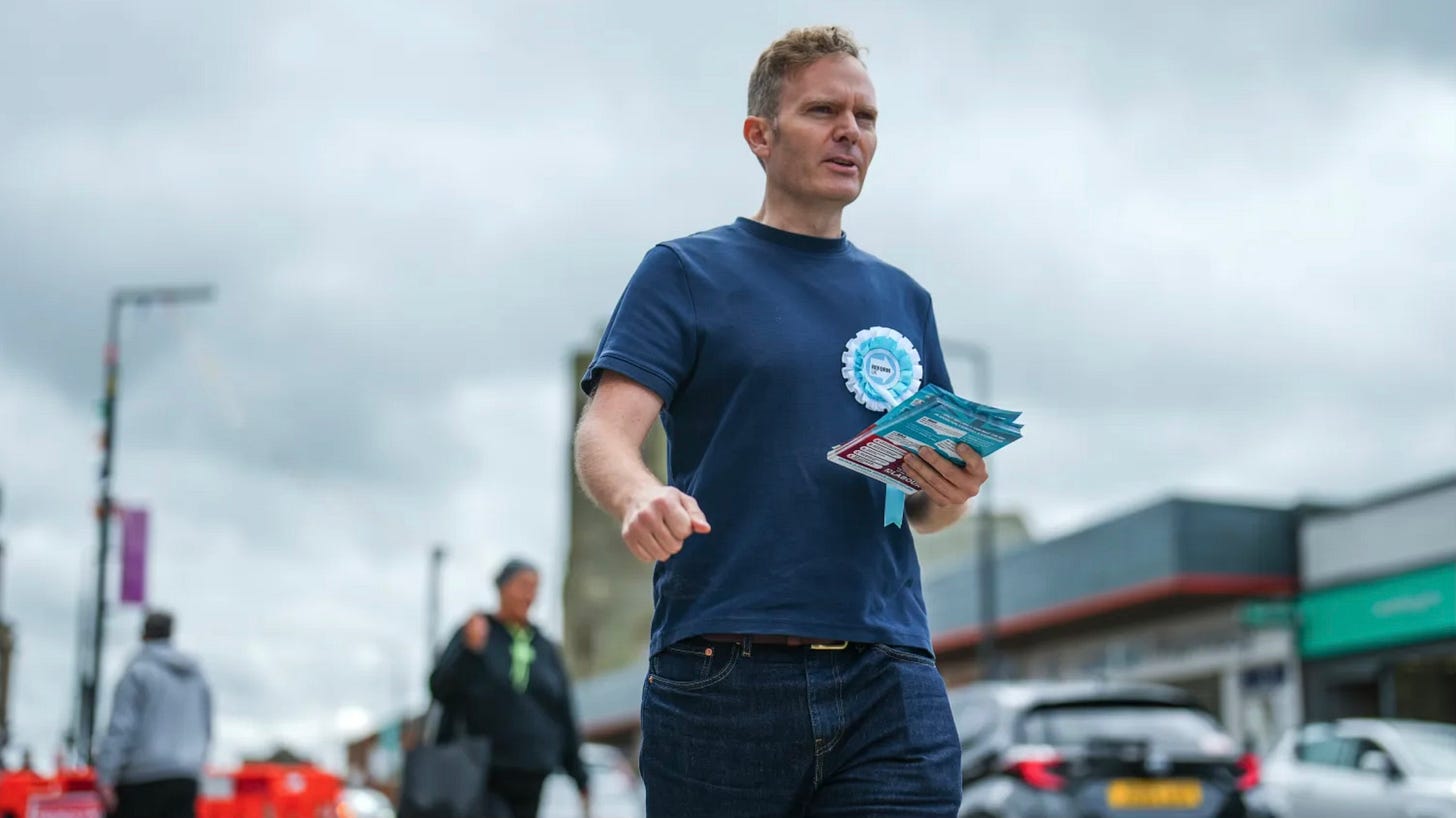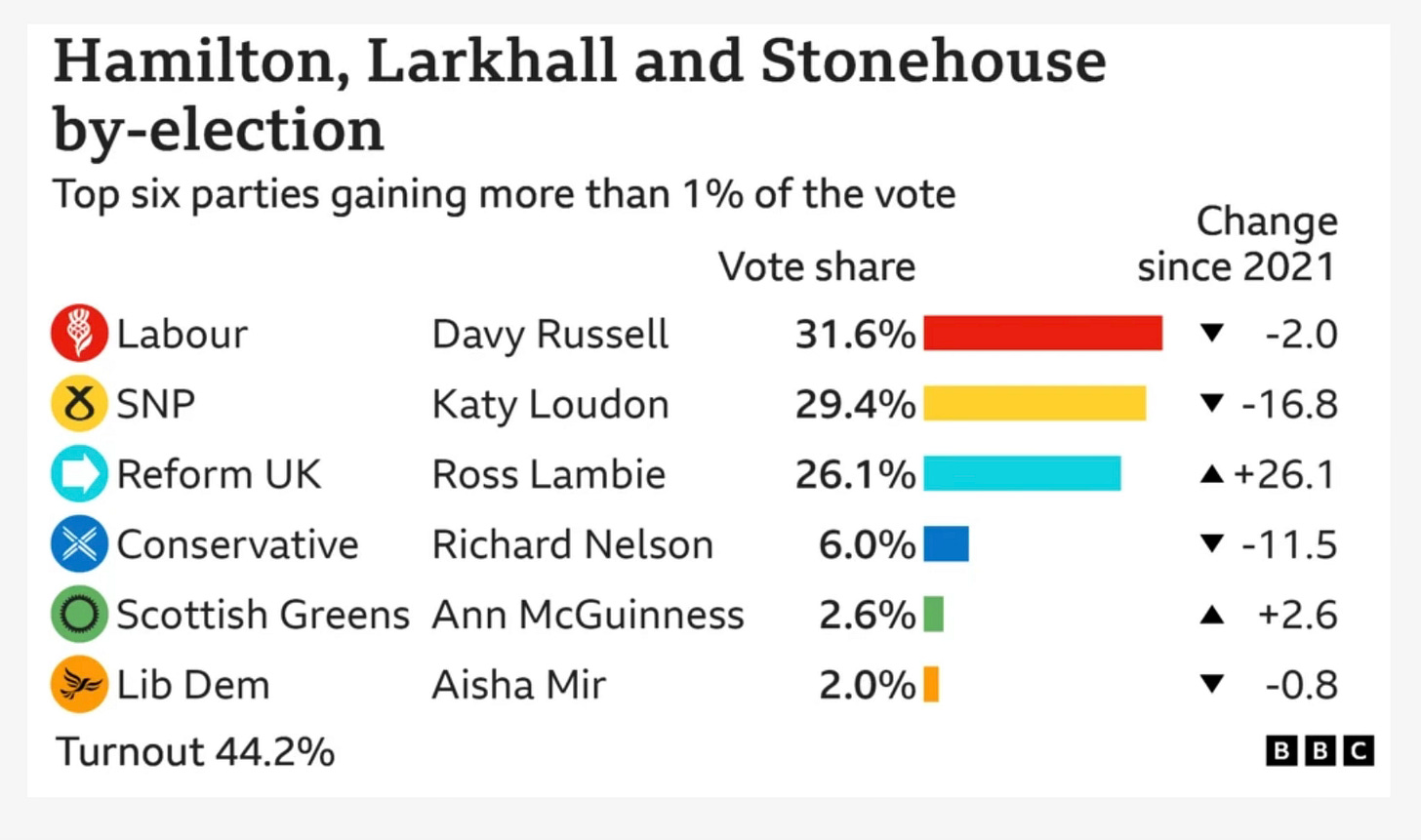The death of Scottish exceptionalism
Reform UK's strong by-election performance is an inflection point in Scottish politics

As Mark McManus liked to say in the TV cop series Taggart, there’s been a murrrderrr. What we have all just witnessed is the death of Scottish exceptionalism.
The result of the parliamentary by-election in Hamilton, Larkhall and Stonehouse was announced at 1:30am this morning and nothing in Scottish politics will ever be the same again.
Do not be misled by the headlines. Today’s news leads on Scottish Labour snatching a seat from the SNP. The tussle between these two behemoths of Scottish politics will continue right up to the Holyrood election next May. But the real news from South Lanarkshire was the performance of Nigel Farage’s Reform UK, which came a close third with 26 per cent of the vote.
This is an inflection point in Scottish politics. Why? Because Reform’s rise challenges one of our most beguiling assumptions, that we Scots are in some way immune from the insurgent nativist populism that has swept the western world over the past decade and become a gathering storm over the past year.
Some folk in Scotland were utterly convinced that we as a nation were above such grubby politics. We were better than this. Specifically, we were better than the English.
I wrote the following in my Times column in 2023 when it became clear England was minded to vote Labour and kick out the Tories:
For a while there really was a prevailing view in this self-congratulatory nation of ours that the dotted line on the map between Solway and Tweed marked not just an administrative border but a moral one.
On the other side was a foreign land. Here be dragons. Here be people not like us. Here be people not as enlightened as us. Here be people, let’s face it, not as good as us.
Shame on us for giving houseroom to an attitude so base.
If we encountered such othering when studying historical disputes in the Balkans or between tribal groups in the Sahel in Africa, we would roll our eyes and shake our heads at man’s inhumanity to man. And yet the same sheep-and-goats sorting has been a central feature of Scottish politics for a generation.
The SNP worldview is reductive not just about England and the English, it also fails Scotland and the Scots. It denies our complexity as a nation, it reduces us to our average.
And so the English are narrow-minded Brexiteers and the Scots are progressive European internationalists. In fact 46.6 per cent of English people voted Remain. And here in Scotland, in every five people standing at a bus stop or in a Post Office queue, roughly two voted for Brexit.
Our nation is richer, more interesting, more nuanced than the uniform version promoted by the SNP. Complicated is good. Multi-layered is good. Contradictory is good. Our Caledonian antisyzygy should be valued, not denied.
It is hard to overstate how deep and entrenched this Scottish exceptionalism has been, going back many decades. For me its apogee was last summer when a range of Yessers tried to use the riots in English cities as fuel for the independence fire.
At the time I wrote the following column. Forgive me for quoting it at length, but I think it captures some of the exceptionalism that now lies in tatters.
What kind of person looks at the riots in English cities and concludes this is an argument for Scottish independence? The kind of person who supports the break-up of Britain beyond reason or rationality, that’s who. The kind of person for whom everything is an augury for indy: English footballing success; flags on teacakes; patterns in tea leaves.
Take the bible of the indy-supporting left, a website called Bella Caledonia. Commenting on rioting in England, its social media account said: “Remember when we were told we were parochial and we should be part of Britain as an outward-looking, multicultural modern country?”
In response to pushback, the account later added: “It is 100 per cent justified in calling into question what this means for us in Scotland. This is not ‘playing the national question’. This is legitimately asking what sort of country Britain is and why we should want to be any part of it.”
The unspoken part of this sentiment was easy to find elsewhere, in posts by social media warriors with saltires for profile pictures. “If you live in Scotland and have a vote,” said one, “why would you vote to remain part of this? Why wouldn’t you want to distance yourself from a right-wing country, England, that is ever increasingly becoming far right?”
Some fairly obvious counterarguments nonetheless require saying. You cannot judge a nation by a tiny minority of its worst citizens. You cannot extrapolate from the rioters to the English as a whole or England as a whole. You cannot ascribe the rioters’ disgusting views to those of the entire British polity. England has rather spectacularly just moved to the centre left. In any case, public opinion on immigration is pretty much identical on both sides of the border.
Muscle memory is an underestimated factor in politics. Scottish nationalism is conditioned to use any excuse at hand to argue for independence. A booming Scottish economy makes a compelling case for a sovereign Scotland. So does a Scotland floundering in recession. The lack of a Labour government at Westminster was once an argument for independence. So, now, is the election of a Labour government. Curiously, nothing can be reasonably construed as an argument against independence. Such conditions do not exist. Nationalism is a one-way ratchet.
At some point, surely, common decency steps in and says some events should not be used to fly the indy flag. Can I tentatively suggest that rioting stoked by disinformation about the murder of three young girls at a Taylor Swift-themed dance class is one such event?
In this awful moment we need to foreground what we have in common, not what divides us. Our shared humanity — beyond borders, beyond nationality — should take precedence over political differences about the constitution. In fact, hair-splitting over how exactly we define subsidiarity seems terribly small.
Surely at some point the penny drops that the corrosive hatred of other nationalities we have seen nightly on our TV screens is not remedied by more nationalist division, however benign ours might be in comparison? Surely the compassionate instinct is to lean in and be part of the British solution, rather than turn tail and dash headlong for the exit? Some socialists have a curious definition of solidarity.
What disappoints me is the apparent belief of some Yessers that an independent Scotland can coorie doon in splendid isolation from bad things happening outwith our borders. Scotland would no longer have to think about England or the English. Malign global forces, be they economic or populist, would no longer pertain. This is like covering your ears and closing your eyes and thinking you are invisible. It is the reaction of a child.
Why has Scotland, so far, been immune from violent anti-immigrant unrest on the streets? The reasons are many and complex, but some simple factors are also at play. We have far fewer immigrants in Scotland. Tens of thousands of refugees have not been landing in small boats every summer on the beaches of Angus or Ayrshire. Rioting is less fun in the rain. Complacency, however, would be foolish.
Recent weeks have been hard for the SNP and the broader independence movement. I get that. Not only has the SNP been humbled in the general election, we now have a centre-left UK Labour government backed by a plurality of Scottish voters. As for the independence cause, its gas is now at a peep.
I can therefore understand why some Yessers are grasping at anything to regain the initiative. And if that something allows them to mount the moral high horse from which they have recently been unseated, I can see the temptation. At the same time, I hope reasonable nationalists who are capable of resisting their movement’s more atavistic instincts have clocked what is going on here. Because I really do think the past few days have exposed a side of Scottish nationalism we all knew was there but which rarely creeps into the light of day.
With its back against the wall, the SNP has a choice. It can take the route apparently favoured by Stephen Flynn, the SNP leader at Westminster, and seize every opportunity to suggest we Scots are morally superior to the English. Or it can look to a historic new engagement with the other peoples on this island, finding common cause to tackle shared challenges, lending a hand in the rewiring of the British state to give Scotland more of a say.
Is the answer to last month’s setback for the SNP more anti-English rhetoric? Or was the message from voters on July 4 a happier one for these troubled times: that maybe we in Scotland can contribute to making Britain a better place for everyone?
Not only nationalists are to blame. I am a home ruler at heart. In the 1980s and 1990s I was a fervent supporter of devolution for Scotland and the creation of a parliament in Edinburgh. My enthusiasm had a number of roots: simple patriotism, undeniably; an intellectual belief in self-government and political accountability, certainly. But there was something else too: a strong feeling that Scotland had rejected the Thatcherism that England had embraced, and that a Caledonian communitarianism needed to be acknowledged in greater autonomy within the UK.
This, I have to admit, was itself a form of Scottish exceptionalism.
Today is day one of the new Scottish politics. Farage is most clearly an existential threat to the Conservatives at both Westminster and Holyrood. Call it a replacement theory if you want to be cheeky about it. What yesterday’s by-election demonstrates is that all the mainstream Scottish parties have cause to be afraid. Labour, definitely. And yes, the SNP too.
The SNP vote in this constituency fell almost 17 percentage points compared to 2021. The question for John Swinney and SNP strategists is how much this can be explained by SNP supporters simply staying at home and how much is insurgent Scottish nationalism shifting to insurgent British nationalism.
This is now one of the keenest questions in Scottish politics.
In December last year I wrote this in The Times:
Farage is tapping into something more powerful than ideological inclination or constitutional preference.
There is, for example, a kind of Scottish nationalist whose primary motivation is an unfocused rage. It is the root of their support for independence, but in truth it is more a question of personal disposition than political analysis. The rage comes first.
The target for this rage might be Westminster, Brussels, Holyrood, Nicola Sturgeon or wokery. This voter is as much a target for Farage as a Brexit-backing Tory or a socially conservative Labour supporter.
Donald Trump’s emphatic win in last month’s American presidential election dispelled any lingering hope across the West that nationalist populism might have peaked. Trump redux has focused minds here in the UK. A new realism has emerged about the potential for Trumpism closer to home.
What is beginning to take shape on both sides of the border is a mobilisation of the disaffected, the taken for granted, the people whose political outlook might be best summed up by the good Scots word scunnered.
The constitutional logjam that existed in Scottish politics for a decade was broken last year when many independence supporters voted Labour to kick out the Tories. The Reform breakthrough last night is another blow to that constitutional binary.
The days of Scotland’s politics being defined by Yes v No are over, at least for the foreseeable future. We can, if we want, use this as an opportunity to shape a radical realignment in how we conduct our politics. First we have to acknowledge the seriousness of the moment in which we find ourselves.
I firmly believe Reform could have won this by-election. The three main legacy parties are deeply unpopular: Labour in power has been a crushing disappointment; the SNP is exhausted, incompetent and flailing; the Tories seem to be in a death spiral. The moment was ripe for a protest vote, a “up yours” to the lot of them.
The Reform UK candidate - the impressive Ross Lambie, who we will surely see again - could easily have surfed this discontent to victory. Reform’s mistake was an ill-judged race row targeting Scottish Labour leader Anas Sarwar. This simply confirmed a conventional narrative that Reform were hard-right racists intent on spreading hateful poison. There was anecdotal evidence from the doorsteps of potential Reform voters recoiling at this clear demonstration of Farage’s true colours.
There will be more to say here on The Jaggy Thistle in the months ahead about what this moment means for Scotland’s future. Regular readers of my Times column will know I have been pushing for some kind of German-style firewall at Holyrood to keep Reform at arm’s length from power. My gut feeling is a grand coalition of Labour and the SNP may be necessary next May to freeze out Reform from any role in choosing the next first minister or influencing a future administration’s budget.
As I argued in The Times last November:
For John Swinney and Anas Sarwar, however, the time to take this seriously is now. The idea of a grand coalition has to take root, in case it is required by circumstances in 18 months’ time. Nothing in the run-up to the next Holyrood election in May 2026 can preclude such a deal. The outline of a possible agreement must be kept at the back of both leaders’ minds, constantly updating as time goes on.
So far I have been getting nowhere with this. Lately I have been worrying that the moral peril of this moment may only be appreciated in retrospect. Maybe now I will get a hearing. Maybe not. Let’s see.
-o0o-
Did you enjoy this post? You did? Please press the heart button - it helps spread the word to other Substack readers.
Why not show your appreciation by becoming a paid or unpaid subscriber to The Jaggy Thistle, if you aren’t already?
A paid membership gives access to every post, plus the archive, plus the ability to comment on posts.
And 10 per cent of every paid subscription goes to the children’s mental health charity The Wave Project, to be spent on their three Scottish branches.
Join the community! Join the conversation! For more details press this button:
Do you have a comment or observation on this post? Please share it by using this button:
“A chield’s amang you takin notes, And faith he’ll prent it.” Robert Burns
-o0o-







The Times has many fine writers but none of them are your equal.
Another great post with an excellent perspective Kenny thank you.
It’s almost a Shakespearean tragedy to witness canny Scots giving their vote away to the snake oil salesmen of Reform. I cling to the hope that it’s an ‘up yours’ protest. Most bye-elections do that.
It sticks in the throat that Scotland could follow the racist English with support for Farage. He is pure poison and will pollute Scottish political life for a generation if support grows.
I have always favoured severance and an independent nation of Scotland. Voting Reform is a journey backward into the political abyss.
Change always comes dropping slow. The aftermath of
14 years of Tory rule can’t be undone in a heartbeat.